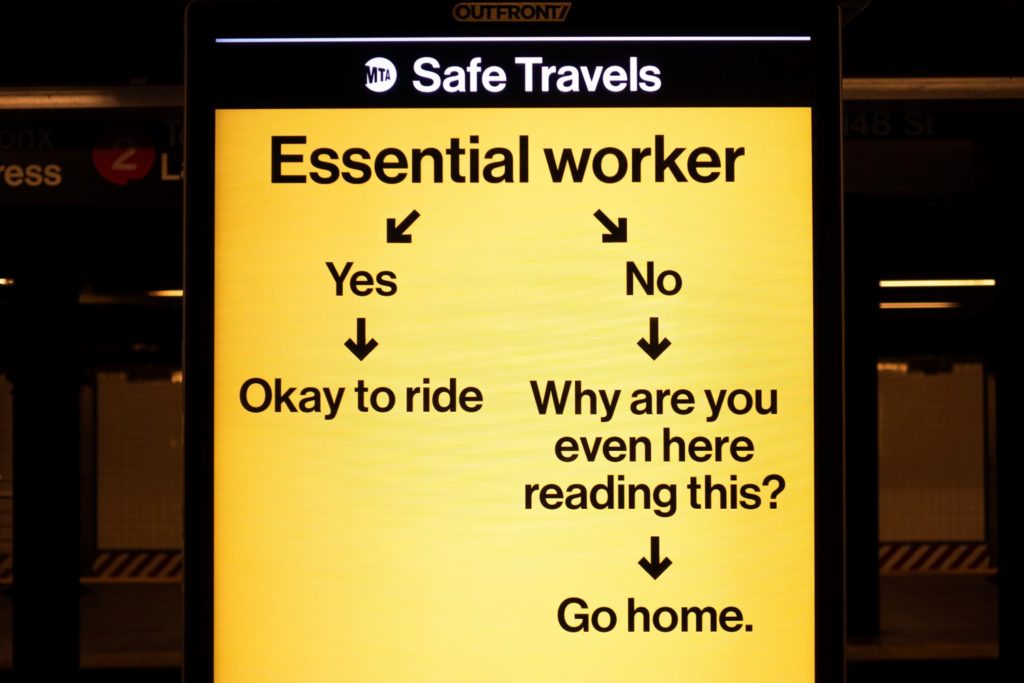 View Winners →
View Winners → What L.A. County Residents and Employers Need to Know About COVID-19 Testing


Sign in New York City reminding subway users to stay home. – Courtesy photo by Daniel Lee on Unsplash
As cases and hospitalizations rise, many residents believe they need to get tested for COVID-19. However, on Tuesday California Health and Human Services Secretary Dr. Mark Ghaly issued new guidelines for who should be tested first to reduce backlogs currently experienced in the state. Now, Los Angeles County health officials say that not everyone should be tested and emphasize preventative measures that individuals and businesses should employ to protect themselves, as much as possible, from the virus.
Keep in mind:
- At this point in this crisis, testing is reserved for those who have a medical or public health reason for it. While Los Angeles County currently has enough testing supplies to meet the needs of those who need to be tested, the number of COVID-19 cases are on the rise here and throughout the country.
- Common-sense rules still apply:
- Stay home as much as possible.
- Leave home only for essential activities like work, medical appointments and grocery shopping.
- Wear a cloth face covering when you’re out in public.
- Stay at least 6 feet apart from people you don’t live with.
- Wash your hands thoroughly and often, and don’t touch your face.
- Check with a health care provider if you think you need to get tested. It’s always best to work with your health care professional to determine the kind of care you need. Unless you have specific symptoms, exposures or risk factors, you may not need to be tested, and your health care provider can talk with you about your concerns and help determine if you need to be tested. If you don’t have a doctor, call 2-1-1 to get a referral.
- Know your risk level. According to the latest Public Health guidance, highest priority for testing should go to people with symptoms — including hospitalized patients, healthcare workers, first responders, employees and residents in group living settings, and people over 65 years old or with underlying health conditions that place them at higher risk of serious complications. Asymptomatic people — those without symptoms — also should be prioritized for testing if they are part of a public health investigation, if they live or work in high risk settings, such as skilled nursing facilities or homeless shelters, if they are a close contact of someone with a confirmed positive diagnosis of COVID-19, or if they are an essential worker.
Prioritization of routine testing among other asymptomatic people is not recommended at this time. People over the age of 65 or with underlying conditions do not necessarily need to be tested unless they have symptoms, have had an exposure or have been told by public health to be tested. Once again, please check with your healthcare provider about your specific situation and let their medical advice guide you. - Employers should not require a negative COVID-19 test result before employees return to work. Employees do not need to present a certificate saying they have tested negative under the current guidance from the Los Angeles County Department of Public Health.
- Employers can offer and pay for COVID-19 testing as an occupational health and safety measure if an employer wishes to have its workforce get tested before returning to a work site. These employees should not seek a test at the city/county/state testing sites, which should be reserved for those who meet the medical or public health criteria for testing, and who do not have access to testing through their regular provider or health plan.
- Healthcare providers are required by a recent L.A. County Health Officer Order to provide their patients with access to COVID testing if they are symptomatic, are part of a public health investigation, or have been in close contact with a confirmed COVID-19 infected person. The Health Officer order also encourages providers to bill private insurance plans for these services whenever possible. Patients are not allowed to be charged by their plan or provider for COVID-19 tests. Obtaining testing through a patient’s regular provider network helps to assure tailored clinical advice and facilitates good follow-up in the case of positive results.
- A COVID-19 test does not protect you from the virus, and a negative result should not be seen as a reason to engage in risky social behavior. A COVID-19 test does not guarantee that you do not have the virus; a false- negative test is possible. Also, even when accurate, a test result only reflects whether you have the virus at the moment you took the test. You could become positive at any time and an exposure to COVID-19 could happen immediately following your test.
- Don’t panic. Although rising case numbers and hospitalizations are cause for concern, we can still turn this around by following the common-sense steps listed above. Los Angeles County came together to flatten the curve earlier in this pandemic, even when testing was much more limited than it is today, and we can do it again.
- More testing capacity is on the way. Appointments may be limited at testing sites due to increased demand. The County and the City of Los Angeles are adding capacity at existing sites, as well as standing up new County- and City-funded sites in high-need communities in the weeks to come.
Regardless of test results, you still need to follow quarantine and isolation orders from Public Health or your provider. If you have been exposed to someone with COVID-19, you need to self-quarantine for 14 days, even if you test negative during that time. If you are experiencing COVID-19 symptoms, you should self- isolate in order to prevent spread of the virus to others and follow these steps:
- Keep your physician informed of your symptoms and consult with your provider about getting tested.
- If you are elderly or have an underlying health condition, seek medical care.
- If you don’t have a physician, call 2-1-1 to get connected to one.
- If you are having trouble breathing or have other severe symptoms, dial 9-1-1 or go to the nearest hospital emergency department immediately.







































































































